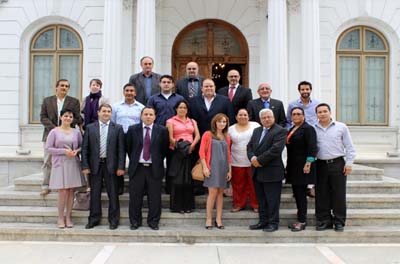Strengthening Land Administration in Honduras

Key Contact
Enrique Pantoja
Start Date
End Date
Funding Amount
$ 47,387
Knowledge-providing Countries
Knowledge-receiving Countries
Summary
Challenges in land administration, such as weak property rights and unequal distribution, have threatened the pace of economic growth in Honduras. The Government has prioritized improving land administration services, which included adopting a unified cadaster and land registration system. Through the Second Phase of its Land Administration Program (PATH II) and other means, the World Bank has supported Honduras. Complementing PATH II, the Bank organized an exchange with Romania and Macedonia to learn how to improve service delivery and build the capacity of Honduran Property Institute. The exchange focused on how to improve the Information Technology (IT) platform for Honduras’ unified property system, forge partnerships with the private sector to manage Honduras’ land registry, and coordinate with local agencies to maintain the cadaster (i.e., the public record of geographical information).
The study tour took place in June 2013 and included officials from the Honduran Property Institute, PATH II, and the World Bank. In Romania, delegates met with staff from the National Agency for Cadaster and Property Registration in Bucharest, and from branch offices in Pitești and Târgoviște. The delegation from Honduras learned about Romania’s successes in adopting a single agency land administration system, engaging the private sector to implement cadaster surveys, and manage work flows at central and local levels. In Macedonia, delegates met with staff from the Agency for Real Estate Cadaster (AREC) and visited two AREC local offices (Skopje and Kumanovo), where they interviewed customers, local staff, and private sector representatives. The delegation learned about the success of AREC’s customer service reforms and IT platform, which had helped to drastically reduce how long it took to register a property: from 98 days in 2004 to 5 or fewer in 2012. In October 2013, the Honduras Property Institute organized a closing workshop to share the lessons from this exchange with Honduran stakeholders and representatives from ten Latin American countries. Representatives from Macedonia and Romania also attended the closing workshop.
Participants increased their knowledge and skills to develop and implement new methods for strengthening land administration services. Since the exchange, the Honduran Government has taken steps to improve business processes and strengthen its IT system, and has created a geo-portal for spatial data. The exchange spawned an online regional forum to continue learning, and was helpful for the Romanians and Macedonians. Victoria Stanley, a Senior Rural Development Specialist at the World Bank, observed, “the exchange was an eye opening experience for all three countries. For Honduras, hands-on learning sessions and site visits sparked new ideas about ways to improve efficiency and service delivery. For Macedonia and Romania, it exposed them to social issues – of indigenous rights and land inequality – in a different way.”
Beneficiaries / Participants
Problems in land administration have impeded Honduras’ economic prosperity. Weak property rights have discouraged investment and access to credit, and the unequal distribution of land has contributed to social instability. The World Bank has provided assistance to improve land tenure security and land administration services, including supporting the Honduran Property Institute through a Second Phase of the Honduras Land Administration Program (PATH II). Within the framework of PATH II, in June 2013 the Bank organized a study tour of officials from Honduras’ Property Institute to Romania and Macedonia. Both of these countries had addressed similar challenges, particularly related to improving their cadasters (records of geographical information) and land registries (records of legal information on land and buildings).
The goal of the exchange was to enhance Honduran participants’ understanding of ways to improve land administration services, and to strengthen their skills to apply them. Specifically, the Hondurans sought to learn how to upgrade their unified property system with a new technological platform, forge public-private partnerships (PPPs) to manage Honduras’ land registry, maintain cadasters at the local level, and find new ways to improve client services. Romania and Macedonia had diverse lessons to share in these areas, especially in regards to applying Information Technology (IT) and Geographic Information Systems (GIS). Though Honduras was the primary knowledge recipient, Romania and Macedonia were expected to learn from Honduras’s experiences in addressing social issues in land administration.

 China
China Colombia
Colombia Denmark
Denmark India
India Indonesia
Indonesia Mexico
Mexico Russian Federation
Russian Federation Spain
Spain United Kingdom
United Kingdom